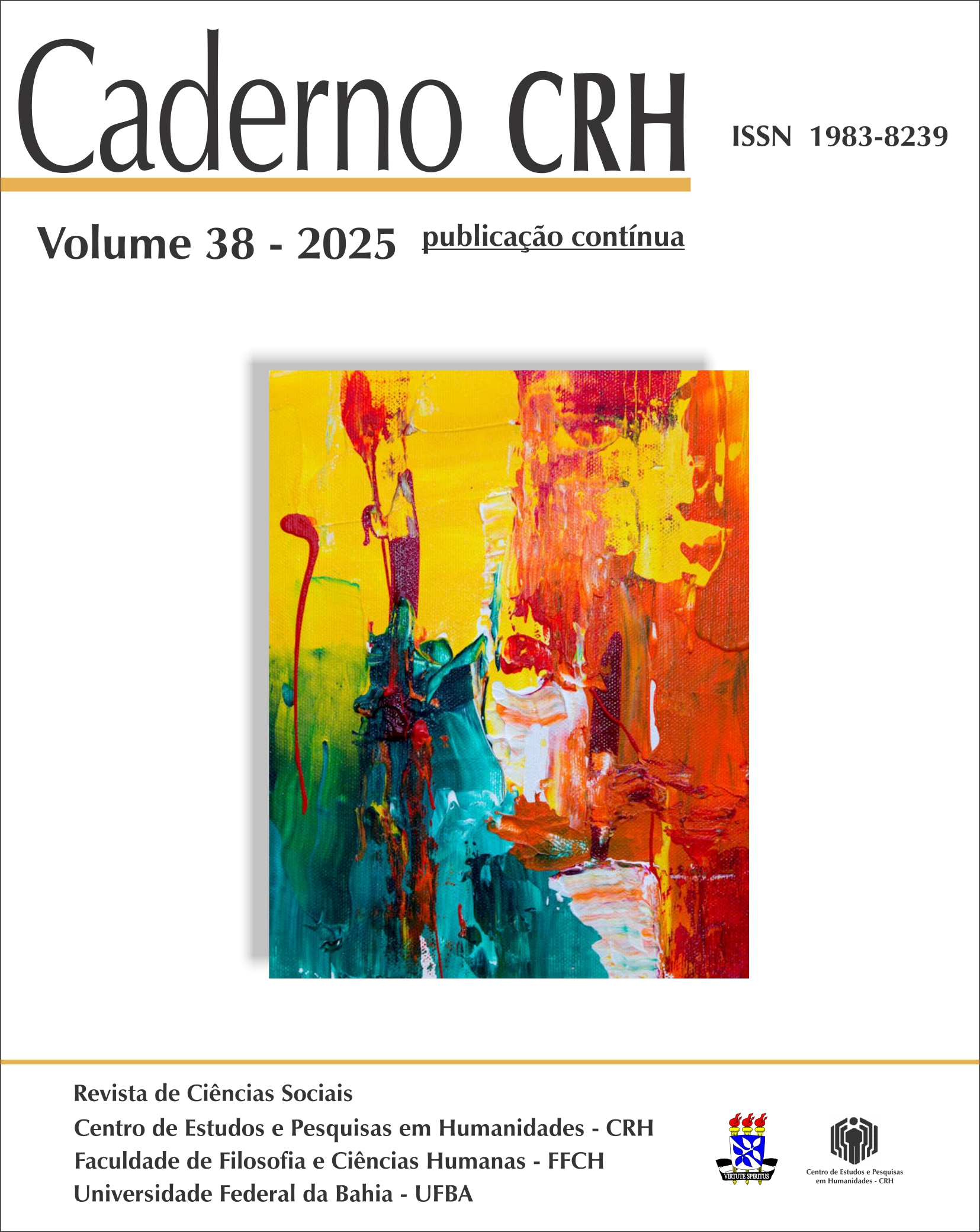TRANSITIONS TO AUTHORITARIANISM IN THE 21ST CENTURY? LIMINAL DEMOCRACIES
DOI:
https://doi.org/10.9771/ccrh.v38i0.64458Keywords:
Democracy, Transition, Social theory, Authoritarianism, LiminalityAbstract
In an American and European context of governments with strong authoritarian elements, this article revisits the question of the classification of political regimes and the shifts between authoritarianismand democracy, proposing a dialogue between classic conceptualizations of studies on the transition to democracy and anthropological theories about situations of liminality. Liminality in anthropology refers
to the specific moment in which a being is neither A nor B, but is in a process where it has ceased to
be A but has not yet become B. With the expansion of “transitional” or undefined political regimes, the
notion of liminality is a relevant complement to the concept of hybrid regimes. Furthermore, from the
outset, there is a counterpoint between the notions of transition and liminality to consider the nuances of
regime change. This article’s concern is specifically with the phase called “transition,” its similarities and
clarifications with the concept of “liminality.” It will also seek to show that this phase tends to stabilize
and lacks a predetermined direction. It is probably worth not only revising our classifications, but also
clarifying how democratic efforts are oriented in contexts of liminal democracies.
Keywords: Democracy. Transition. Social theory. Authoritarianism. Liminality.
Downloads
References
ARDITI, B. Is There Such a Thing as Populism? 3 Provocations and 5 1/2 Proposals. Nueva York: Routledge, 2025.
CRUTZEN, P. J. Y STOERMER, E. F. «The ‘Anthropocene’». Global Change Newsletter, v. 41, p. 17-18, 2000. Disponível em: chrome-extension://efaidnbmnnnibpcajpcglclefindmkaj/ https://www.egu.eu/newsletter/geoq/12/externalnews.pdf Acesso em: 1 mar. 2025.
GARATEGARAY, M.; REANO, A. La transición democrática en debate. Una propuesta teórico-metodológica para el análisis de las transiciones latinoamericanas. Izquierdas, v. 49, p. 706-724abril 2020. DOI:10.4067/S0718-50492020000100238 Acesso em: 1 mar. 2025.
GARATEGARAY, M. Reflexiones sobre la transición a la democracia: de la ciencia política a los lenguajes políticos. Millcayac - Revista Digital de Ciencias Sociales, [s.l.], v. 10, n. 19, 2023. Disponível em: https://revistas.uncu.edu.ar/ojs3/index.php/millca-digital/article/view/7068. Acesso em: 12 mar. 2025.
GARCÍA CANCLINI, N. ¿De qué lado estás? In: GRIMSON, A. (comp.). Fronteras, naciones e identidades. [s.l.]: La Crujía, 2000.
GARCÍA CANCLINI, N. El mundo entero como un lugar extraño. Barcelona: Gedisa, 2014.
GRIMSON, A. Paisajes emocionales de la ultraderecha masiva. ¿La gente vota contra sus intereses?, México: Universidad de Guadalajara, 2025. Disponible en https://editorial.udg.mx/gpd--9786075813172-67377a99ef0e9.html Acesso em: 1 mar. 2025.
GRIMSON, A. La nación en sus límites. Barcelona: Gedisa, 2004.
HILL COLLINS, P. Learning from the Outsider Within: The Sociological Significance of Black Feminist Thought. Social Problems, [s.l.], v. 33, Issue 6, p. s14–s32, 1986. DOI: https://doi.org/10.2307/800672 Disponível em: https://academic.oup.com/socpro/article/33/6/s14/1610242 Acesso em: 1 mar. 2025.
ILLOUZ, E. La vida emocional del populismo. Cómo el miedo, el asco, el resentimiento y el amor socavan la democracia. Buenos Aires: Katz Editores, 2023.
LACLAU, E. La razón populista. Buenos Aires: Fondo de Cultura Económica, 2005.
LESSGART, C. Usos de la transición a la democracia. Ensayo, ciencia y política en la década del ochenta. Estudios sociales, [s.l.], v. 22-23, p. 162-185, 2003.
LESGART, C. Entre las experiencias y las expectativas. Producción académico-intelectual de la transición a la democracia en el Cono Sur de América Latina. Ayer. Revista de Historia Contemporánea, Madrid, España, v. 81, n. 1, p. 145–169, 2011. Disponível em: https://www.revistasmarcialpons.es/revistaayer/article/view/lesgart-entre-las-experienciasy-las-expectativas. Acesso em: 12 mar. 2025. LESSGART, C. Usos de la transición a la democracia. Rosario: Ediciones Homo Sapiens, 2023.
LEVITSKY, S.; ZIBBLAT, D. Cómo mueren las democracias. Barcelona: Ariel, 2018.
MOUFFE, C. Por un populismo de izquierda. Buenos Aires: Siglo XXI, 2018.
NUN, J. La teoría política y la transición a la democracia. In: NUN J. PORTANTIERO, J. C. Ensayos sobre la transición a la democracia en Argentina. Buenos Aires: Puntosur, 1987. p. 15-56.
NUN, J.; PORTANTIERO, J. C. 1987. Ensayos sobre la transición a la democracia en Argentina. Buenos Aires: Puntosur, 1987.
O’DONNELL, G., SCHMITTER, P.; WHITEHEAD, L. Transitions from Authoritarian Rule. [s.l.]: The Johns Hopkins University Press, 1986.
RANCIÉRE, Jacques. El desacuerdo. Buenos Aires: Nueva Visión, 1995.
REGUILLO, R. Necromáquina. Cuando morir no es suficiente. Barcelona: Ned, 2021
RUSTOW, D. Transitions to democracy. Toward a Dynamic Model. Comparative Politics, [s.l.], v. 3, 1970.
SELIGMAN, L. To Be In Between: The Cholas as Market Women. Comparative Studies in Society and History, [s.l.], v. 31, n. 4), p. 694-721, 1989.
SEMÁN, P. (coord.). Está entre nosotros. Buenos Aires: Siglo XXI, 2023.
TURNER, V. Variations on a Theme of Liminality. In: DE MOORE, Sally. Falk and Meyerhoff, Barbara: Secular Ritual. [s.l.]: Van Gorcum, 1977.
TURNER, V. La selva de los símbolos. Madrid: Siglo XXI, 1999.
VAN GENNEP, A. Los ritos de paso. Buenos Aires: Alianza editorial, 2008.
VIDA, S. Los regímenes políticos híbridos: democracias y autoritarismos con adjetivos. Revista de estudios políticos (nueva época), Madrid, enero-marzo, p. 165-185, 2010. Disponível em: https://recyt.fecyt.es/index.php/RevEsPol/article/view/44340 Acesso em: 1 mar. 2025.
ZAKARIA, F. The Rise of Illiberal Democracy. Foreign Affairs, 1997.
Downloads
Published
How to Cite
Issue
Section
License

This work is licensed under a Creative Commons Attribution 4.0 International License.
Todo o conteúdo da revista, exceto onde indicado de outra forma, é licenciado sob uma atribuição do tipo Creative Commons BY.
O periódico Caderno CRH on-line é aberto e gratuito.





